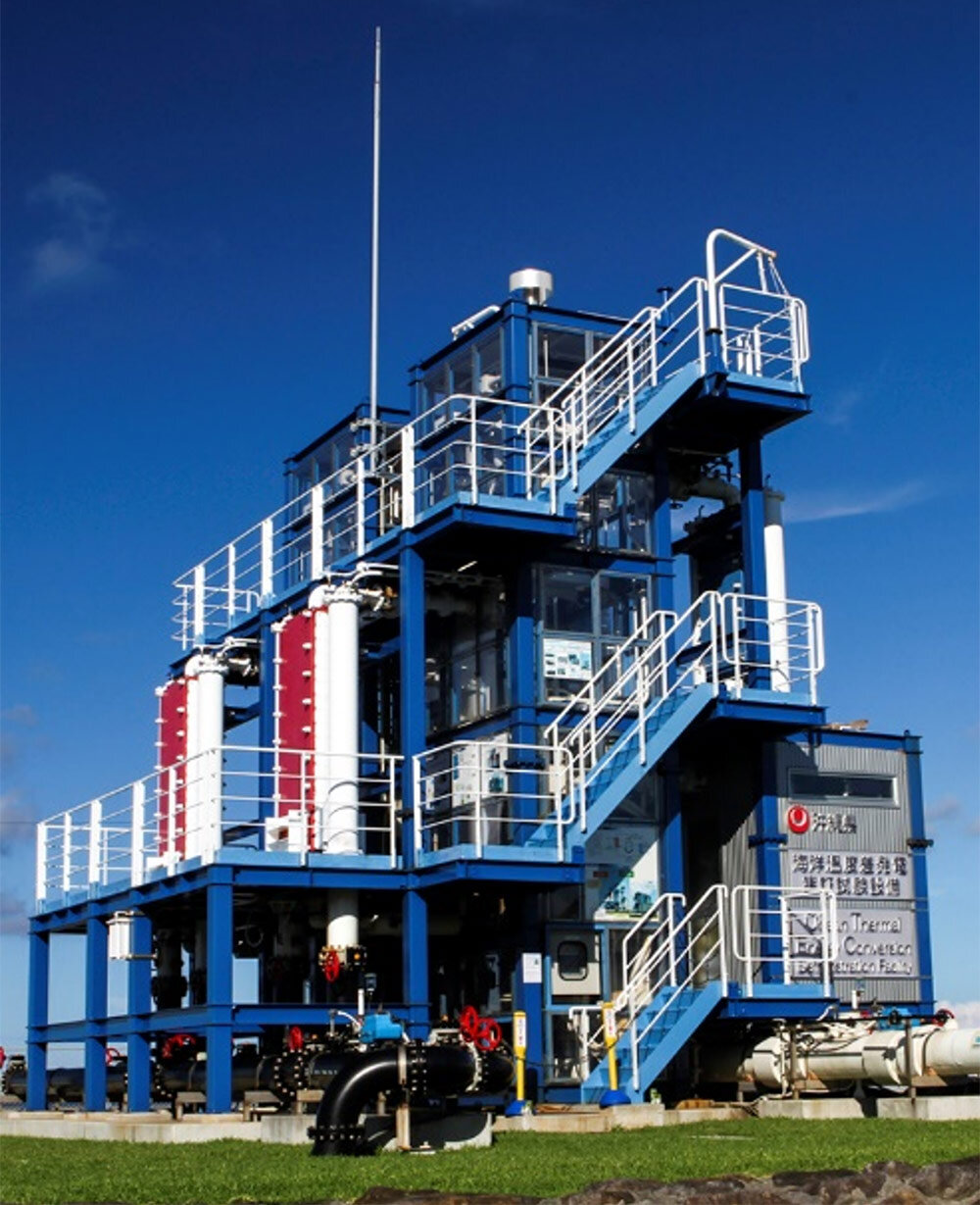- JP
- EN
Ocean Thermal Energy Conversion Project in Mauritius Moves Toward Commercialization
- Selected as METI Program; Aiming for Swift Practical Implementation of Marine Renewable Energy -
January 15, 2024
TOKYO-Mitsui O.S.K. Lines, Ltd. (MOL; President & CEO: Takeshi Hashimoto) today announced that its "outline study on installation of water intake pipes" was selected for a program commissioned by the Ministry of Economy, Trade and Industry (METI) (FY2023 Infrastructure Development Investigation Program for Joint Crediting Mechanism (JCM)). The outline study is part of the "Feasibility study on Deep Ocean Water Applications Model for Commercialization of Ocean Thermal Energy Conversion (OTEC) in Mauritius."

Photo: The Ocean Thermal Energy Conversion Demonstration Test Facility owned by Okinawa Prefecture (Kumejima Town)
In the "Study on the Conformity of Demonstration Requirements for the Combined Use of Deep Ocean Water with OTEC as the Core in Mauritius"(Note 2), commissioned by the New Energy and Industrial Technology Development Organization (NEDO) from May 2022 to May 2023, MOL reviewed the viability of the Mauritian side to be the main development entity and the conditions for the installation of OTEC facilities, narrowed down the candidate sites, and selected a site on the south-southwest area of Mauritius.
The next step is to investigate and analyze various conditions for installing water intake pipes at suitable sites. Verifying the appropriateness of the candidate sites is the main content of the investigation project selected by METI.
OTEC uses the temperature difference between warm water in the surface layer and cold water in the deep sea to generate electricity. Deep ocean water is pumped up from a depth of 600m or more and the energy is extracted from the temperature difference between the deep ocean water and the surface ocean water. Since OTEC is not greatly affected by weather conditions, it is capable of stable power generation 24 hours a day, ensuring stable and predictable power output.
Mauritius can not only take full advantage of its location in the tropical Indian Ocean region, but also has a strategic national foundation for the introduction of OTEC, with a roadmap to increasing the share of renewable energy to 60% by 2030, as a pilot project for the introduction of OTEC included in the national budget plan.
This project is also expected to lead to more reliable and effective support for Mauritius by studying the use of the Climate Technology Centre & Network (CTCN, Note 3) and the Green Climate Fund (GCF, Note 4).
MOL aims to commercialize OTEC at an early stage in Japan and overseas, including Mauritius, by leveraging the knowledge and expertise it has accumulated through offshore business and its supply chain network.
(Note 1) For details, please refer to the March 24, 2023, press release:
Ocean Thermal Energy Conversion Demonstration Project in Okinawa Selected by Japan's Ministry of the Environment - Aiming to Commercialize World's 1st Ocean Thermal Energy Conversion by around 2026 -
(Note 2) For details please refer to the July 14, 2022, press release:
Verification Research of Feasibility and Dissemination of Ocean Thermal Energy Conversion in Mauritius Selected for NEDO Project - Accelerating Commercialization of Ocean Renewable Energy, Following Project Now in Operation in Okinawa -
(Note 3) COP16 (2010) decided to establish the CTCN as an implementing agency to promote technology transfer related to climate change. It started operating and providing services in 2013. Based on requests from developing countries, it provides support according to the needs of each country.
(Note 4) GCF is a fund entrusted to administer a financing system under the United Nations Framework Convention on Climate Change (UNFCCC) to help developing countries reduce greenhouse (GHG) emissions and mitigate the effects of climate change.
MOL Group 5 Sustainability Issues
MOL Group identifies "Sustainability Issues" (Materiality) as our key issues for sustainable growth with society through realization of the Group Vision.
We anticipate this initiative to contribute especially to the realization of "Safety & Value -Provide added value through safe transportation and our social infrastructure business-", "Environment -Conservation for Marine and global environment-," "Human & Community -Contributing to the growth and development of people and communities-" and "Innovation -Innovation for development in marine technology-."

